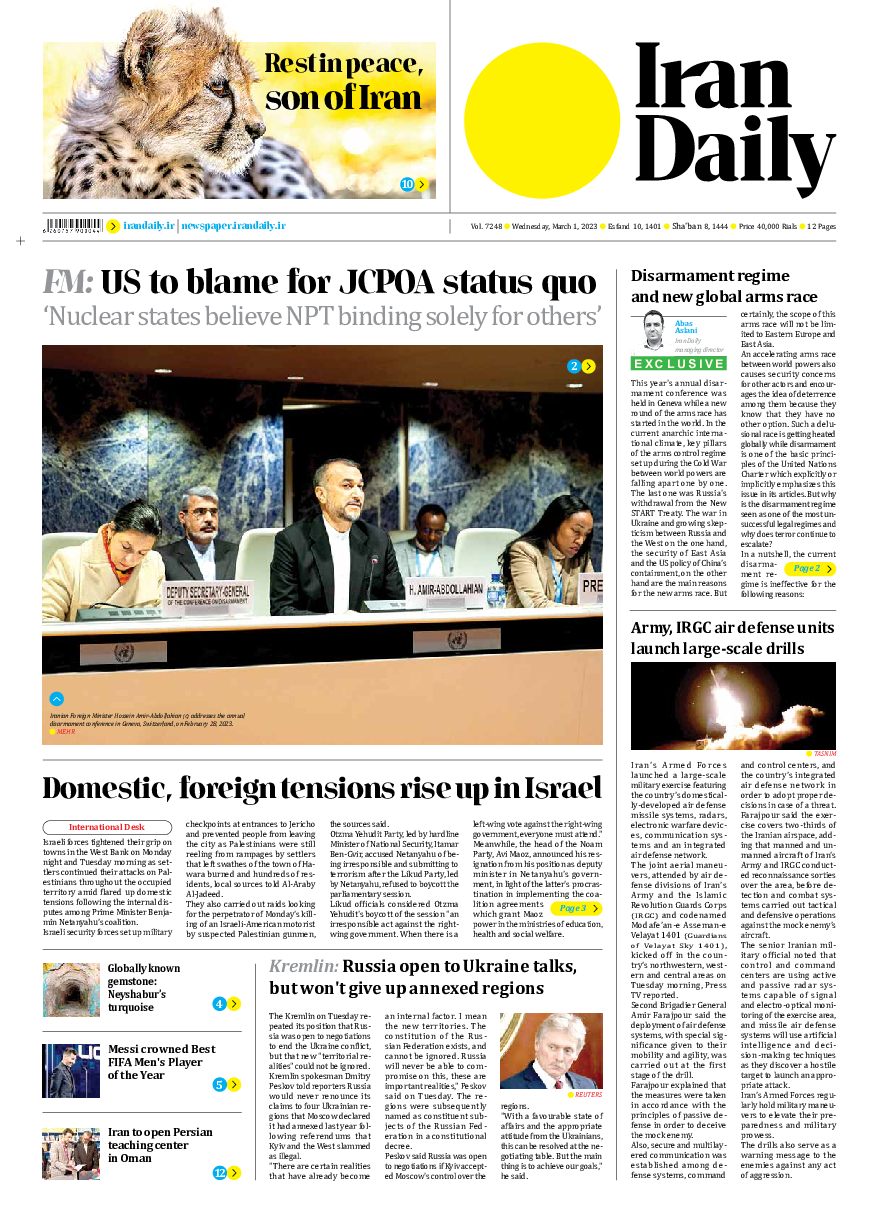
Disarmament regime and new global arms race
Abas Aslani
Iran Daily managing director
This year's annual disarmament conference was held in Geneva while a new round of the arms race has started in the world. In the current anarchic international climate, key pillars of the arms control regime set up during the Cold War between world powers are falling apart one by one. The last one was Russia's withdrawal from the New START Treaty. The war in Ukraine and growing skepticism between Russia and the West on the one hand, the security of East Asia and the US policy of China’s containment, on the other hand are the main reasons for the new arms race. But certainly, the scope of this arms race will not be limited to Eastern Europe and East Asia.
An accelerating arms race between world powers also causes security concerns for other actors and encourages the idea of deterrence among them because they know that they have no other option. Such a delusional race is getting heated globally while disarmament is one of the basic principles of the United Nations Charter which explicitly or implicitly emphasizes this issue in its articles. But why is the disarmament regime seen as one of the most unsuccessful legal regimes and why does terror continue to escalate?
In a nutshell, the current disarmament regime is ineffective for the following reasons:
Developments affect disarmament debate
The process of disarmament and arms control have always been discussed by actors as a main topic or on the sidelines of their meetings in accordance with international developments. However, whether disarmament is put on the agenda or taken off has been tightly controlled by world powers, especially in the West. The 9/11 attacks were the last incident that turned the issue of arms control into a global discourse. But the US unilateral and warmongering policies, adopted under this pretext, made the world suspicious about the discourse.
Discrimination
Although there are several treaties on arms control, testing and non-proliferation, disarmament is still more a of pressure tool in the hands of powers, who possess more and more modern weapons, against other actors than a justice-oriented legal regime. Iran's peaceful nuclear program, on the one hand, has become an excuse for mounting political and economic pressure on the country and even launching terrorist attacks against it, and on the other hand, while Israel is not a member of the most important arms control treaties, it is rather increasingly developing technologies for weapons of mass destruction.
Arms technologies development
Weapons-related technologies, like other fields, are growing even faster and more technically and imperceptibly, and they pose new threats that prompt actors inevitably to take unilateral and immediate measures. In fact, the growth rate of threats is faster than the rate of providing collective and controlling mechanisms. As a matter of fact, there are weapons used by powers that are not known to the world. In the same way, actors constantly ask themselves, how critical and irreparable are the security and technical consequences of committing to pacts and treaties that others do not adhere to? Don't they endanger the lives of their nations with more commitments?
Contradiction in theory and practice
Legal regimes are the products of abstract and idealistic theories, so they are not easily able to overcome systemic realities. It is these systemic realities, friendships and enmities and their complex security calculations that regulate the behavior of parties involved. During the Cold War, one of the most important reasons for the ineffectiveness of the disarmament regime was the arms race between major powers. This is a very important question. After the collapse of the Soviet Union, did the wars end in the past decades when the US presented itself as the sole global superpower and norm-maker? Wasn't America the initiator of most wars?
Imbalance between commitments and guarantees
Another fact about the disarmament legal regime is that actors in related treaties give commitments that weaken their security against actors that back down on their promises. Meanwhile, there is no guarantee that the above-mentioned legal regimes will be able to compensate for security expenses when committed actors face insecurity. In addition, past experiences have also made actors skeptical about guarantees for fair implementation.
All these reasons have created conflicting views about the desirability of the disarmament system and the relevant legal regime. The fact is that the proliferation of weapons is carried out by the big bearers. They are getting richer and more armed by the day, while the other actors become poorer. However, in this vicious cycle, disarmament debate still comes very handy for the main proliferators including the US and Israel. Pumping billions of dollars of weapons to crisis and conflict areas, including to the war in Ukraine and the Middle East, along with their inconsistent political stances in international conferences, is a clear example of this vicious cycle.







